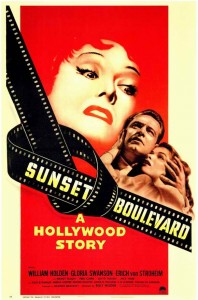|
Genres, Themes, Actors, and Directors:
- Actors and Actresses
- Billy Wilder Films
- Erich von Stroheim Films
- Flashback Films
- Gloria Swanson Films
- Has-Beens
- Hollywood
- Jack Webb Films
- Love Triangle
- May-December Romance
- Nancy Olson Films
- Prostitutes and Gigolos
- William Holden Films
- Writers
Response to Peary’s Review:
As Peary notes, Billy Wilder’s Sunset Boulevard “remains the harshest indictment of Hollywood on film” — not only “assaulting those who have made [it] a place where talent and integrity have little meaning”, but offering a “funeral elegy to old-style Hollywood films”. Despite its gloomy thematic premise, however, it’s a surprisingly enjoyable movie, full of fabulous set designs, stand-out performances (particularly by Swanson), memorable scenes, and dark humor. The story itself is densely layered: in addition to its sharp critique of Hollywood, Sunset Boulevard is both a suspenseful noir “romance” (with Swanson an atypical femme fatale), and — as noted by both Peary and DVD Savant (see link below) — an unusual “ghost story” with a “morbid, death-obsessed plot”, and countless “horror-movie references and imagery”. Perhaps the strongest indication of Sunset Boulevard‘s brilliance, however, is that our knowledge of Joe’s ultimate fate (his corpse narrates the story) does nothing to mitigate our enjoyment of the film as it unfolds.
Redeeming Qualities and Moments:
Must See?
Definitely. This is an undisputed classic of American cinema, and merits multiple viewings. Discussed at length in Peary’s Cult Movies (1981).
Categories
- Genuine Classic
- Noteworthy Performance(s)
- Oscar Winner or Nominee
(Listed in 1001 Movies You Must See Before You Die)
Links:
|

3 thoughts on “Sunset Boulevard (1950)”
A must? DUH! It very much “merits multiple viewings”!
‘SB’ – this story of “an older woman who’s well-to-do…a younger man who’s not doing too well…” – might very well be in my personal all-time top 10. The main reason, no doubt, is that it is so “densely layered”. This is one jam-packed movie, a feast for real film fanatics – as Norma Desmond calls them, “those wonderful people out there in the dark.” – the ones who, when day is done, just want a walloping-good story. Which ‘SB’ is. It grabs you at the throat from the opening shot – the one that tells you you’re in the gutter. It’s bold, challenging, risky, sexy, dark, witty, subtle and simultaneously in-your-face. The script is smart, snappy, full of small, potent touches, endlessly quotable and literate (!). Collectively speaking, this is hot cinema!
It’s hypnotic, from that early shot of Holden in the pool – sheesh! (Speaking of which…Holden later…perfection shirtless…but I digress.)
I know many consider ‘SB’ camp but it’s much too classy for that. Too knowing. (Although, with a select few, it will work on that level.) It’s funny – and sad – that Swanson’s character is just as down-and-out as Holden’s…him being on the way up, her being on the way down. She’s rich, he’s not; she’s old, he’s hot; but they’re in the same boat. To me, this is pointed up most clearly in a scene midway…in which Holden makes a decision…and there’s a pause before he wishes Swanson “Happy New Year”…and another pause before she wishes him the same.
Favorite exchange…
Olson: Where have you been keeping yourself? …
Holden: I haven’t been keeping myself at all. Not lately.
Second favorite exchange…
Repo Man: That car better be back here by noon tomorrow or there’s gonna be fireworks.
Holden: You say the cutest things.
[Note: tough Academy year. Judy Holliday beat out Swanson and Bette Davis – for ‘All About Eve’ (others: Anne Baxter and Eleanor Parker). Should really have been a 3-way-tie that particular year.]
Holden IS indeed a hunky monkey!! 😉
[SPOILER AHEAD:]
You said it! – that’s part of what makes the early ‘dead monkey scene’ so interesting: Swanson kind of just trades in ‘the old model’. Note how, near the end, when Holden is reaching his once-and-for-all firm resolve (great silent acting there), he paces back and forth, as if in a cage…a bit like a monkey who’s grown into a brooding gorilla who sees exactly what he is – and which, perhaps, is why he forces Olson away.